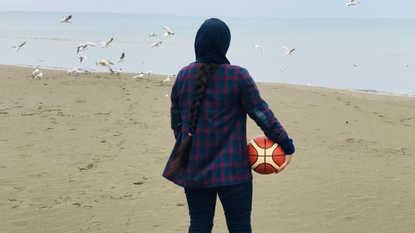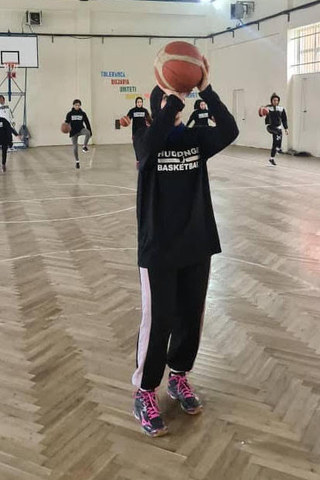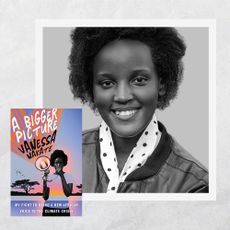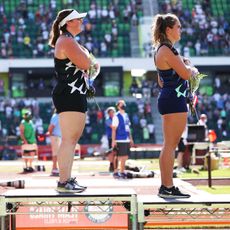Her Love of Basketball Left Her Stateless
One athlete’s quest for freedom from Afghanistan, where the Taliban's restrictive and regressive policies on women's sports put her life in danger.

She discovered basketball in a grade-school sports class, and her dream began. She imagined training every day and improving her skills, playing on a team. Sounds simple enough, but as a girl growing up in Afghanistan, she knew it might be impossible.
At the time, opportunities were opening up for women and girls following the ouster of the oppressive Taliban regime by U.S.-led forces in 2001. But women and girls still faced many battles for their basic rights—including the right to go to school, play sports, and get a job. “When schools opened at that time, most people didn’t give permission for their girls to go,” says Amina, whose name has been changed for this story to protect her family. “Some of my relatives told my father, ‘Why do you send your girl to day school? She should be in the house. She should learn the house chores because in the future she should get married.’ ”
Through sheer determination, Amina managed to achieve her goal, joining the Afghan women’s national team before the age of 20. Basketball gave her the opportunity to travel beyond her city, and eventually, her country, for the first time. She pictured herself using the confidence and experience she had gained to become a government leader one day, continuing to change people’s perspectives on women’s rights.
But she wouldn’t get the chance.
When the Taliban seized control of the country amid the withdrawal of U.S. troops in August 2021, women faced a harsh new reality. “In Afghanistan now, the Taliban are actively depriving women of livelihoods, sports, schooling, and identity,” says Minky Worden, director of global initiatives at Human Rights Watch, a nonprofit that investigates and exposes abuses around the world. “Among the very first acts by the Taliban was banning all sports for women and girls. That sent a harsh message to Afghan women and girls that they have no right to be healthy and happy in public.” Indeed, a Taliban official said in September that women would not be allowed to play sports that would leave their bodies “exposed,” an edict in line with the militant group’s history of forcing women to cover themselves from head to toe.
Amina’s basketball career was not only over, but it put her life at risk. “She was a national player with high visibility in traditional and social media,” says Mara Gubuan, founder of Equality League, a nonprofit focused on gender equality in sports that has been working with Afghan women athletes to help them get to safety. Amina’s prominence made her a prime target, given the Taliban’s long history of violence against women: Under prior Taliban rule, women were not even allowed to leave the house without a male companion; those who did risked being flogged, stoned, or executed. Amina had taken on a public role—the Taliban could decide to make an example of her.
Amina knew she needed to find a way out. It seemed like another impossible dream, but that had never stopped her before. Her quest to escape the country—and the story of how she managed to make it happen—is a testament to her courage and strength, and a window into life for women in Afghanistan. But it’s not over yet.
Stay In The Know
Get exclusive access to fashion and beauty trends, hot-off-the-press celebrity news, and more.
Amina is accustomed to fighting battles for her freedoms; she has been doing so since she was a child, pursuing her love of basketball against the odds. She started by sneaking off to a local gym after school to practice with a city girls’ team, telling her parents she was doing extra coursework. But when the coach wanted her to travel to a competition in the capital of Kabul, she had to ask her parents—a daunting task.
She gathered the courage to open up to her mother, hoping she would break the news to her dad. “My mom always supported me and tried to change my father’s ideas,” she says. But news of the basketball team came as a shock. “She said, ‘What? If your father hears, he will take you out of school. And what will our neighbors say about you?’ ” Amina recalls.
She eventually convinced her mother to talk to her dad, but it didn’t go well. Amina listened from another room. “My mom cried, ‘You should support your girl; she is good. You can go to the gymnasium and speak with her coach. You will see her friends; they are all good people. She will be healthy and happy.’ He was shouting, ‘I never should have let her go to school; she became a bad girl,’ ” Amina says. “I think he worried about our culture, our customs; he worried about other people.”
If they took Afghanistan, there is no way for me; life is not valuable for me.
Frustrated, Amina refused to eat until her father agreed to meet with the coach. “My coach spoke a lot with my father about my future,” she says. “He said, ‘One day, you will be proud of your daughter.’ Because my coach was an old man, my father accepted that.” Her dad said she could play on the team, as long as she didn’t tell her relatives.
She laughs as she recalls traveling to Kabul for the first time. She had never flown on an airplane before. Girls rarely traveled anywhere without their parents. “It was the first trip in my life. I took just my basketball clothes and basketball shoes,” she says—it hadn’t occurred to her to bring anything else. When she wanted to take a shower, she had to ask her teammates to borrow shampoo, much to their amusement.
She joined the Afghan women’s national team in 2010, a proud moment for both her and her family. “My father 100 percent changed,” she says. “After that, my father gave permission to my sister: ‘You should go to basketball.’ I was very happy because I could change my father’s mind.”
While on the team, Amina started college and got married. “I had a crazy schedule,” she says. She faced more battles as well: Some of her in-laws disapproved of her playing basketball and criticized her husband for it. “They said, ‘Why do you give permission for your wife to go to the gymnasium? She should be in the house,’ ” she says. “But my husband and my father-in-law supported me.”

Amina loves that she gets to practice with her teammates for now, but their future is uncertain.
She soon started a family and got a job with an international nonprofit teaching literacy to women, to help bring in some money. She took a couple years off from basketball, rejoining the national team in 2014. She was steadily rising in prominence, advocating for women in sports in the media and planning to get a master’s degree, when Taliban forces began seizing cities across the country.
Amina knew what that meant: “If they took Afghanistan, there is no way for me; life is not valuable for me,” she says, adding that above all else, “I was worried about my family, my husband, because, always, he supported me.”
In early August, she heard the sounds of shooting and fires as the Taliban stormed her city. When the militants took control on August 12, she scrambled to find a way to flee. She decided to head to the airport in Kabul, quickly packing a few items of clothing for her family. She didn’t know how they would manage to catch a flight out of the country. She just knew she had to try.
Before she left home, she hid her basketball certificates and paraphernalia so the items wouldn’t put her parents at risk if the Taliban were to find them. She took her university diploma, which she hid in her pants in case the Taliban stopped her at a checkpoint and took issue with her being an educated woman. “I heard the Taliban was everywhere and they would search every person,” she says. Then she crammed onto a bus with her family, on a journey to an uncertain fate.
When Amina arrived in Kabul three days later, she saw the Taliban celebrating in the streets, firing their guns into the air. Her family found a room at a shabby hotel near the bus station. Depressed and exhausted, she couldn’t believe that her future and her hard-won freedoms had suddenly disappeared. “In one moment, everything changed,” she says. “Like a dream, I tried to wake up, but I couldn’t.”
When she heard that it might be possible for vulnerable Afghans to board U.S. military flights amid the U.S. evacuation, she felt more hopeful. She texted her teammates to see if they wanted to try to evacuate with her, and some met up with her at the hotel. They tried to make their way to the airport, but chaos reigned—thousands of people were rushing to try to catch flights out of the country. “I thought, All of Afghanistan is here,” she says. Day after day, Amina’s family and teammates kept trying to get through the crush of people, to no avail. On August 26, when a suicide bomber killed at least 180 people outside the airport, her family had left the area just a few hours earlier to head back to the hotel.
The U.S. military evacuation concluded at the end of August, leaving control of the airport to the Taliban. Amina lost hope. At the hotel, things were getting dicey; she and her husband had run out of money, and her teammates worried that they would draw the Taliban’s attention for being single women staying in a hotel. To their relief, a man Amina had met through the sports world, who is not being identified in this story to protect his family, said they could take shelter at his house in Kabul.
In one moment, everything changed. Like a dream, I tried to wake up, but I couldn’t.
Little did Amina know, she had an advocate a world away in America. Equality League’s Gubuan was determined to help Afghan women athletes escape. Her colleague Nida Ahmad, Ph.D., contacted an Afghan member of the International Olympic Committee, Samira Asghari, requesting rosters of the women’s national teams. Gubuan got the list of names and started contacting global organizations that she hoped could help. When she learned that FIFA, the world governing body for soccer, would be evacuating members of the women’s soccer community, Gubuan sent along the names of women on the other national teams, including Amina and her basketball teammates. FIFA said it could help members of the basketball team as well.
When Amina heard the news, she felt a flicker of hope again.
FIFA arranged for Amina’s family, teammates, and the man who had sheltered them in Kabul to board a flight to Canada, via Qatar, in October. And not a moment too soon. Amina heard that just days earlier, the Taliban had shown up at the gym where she used to train, demanding information about the women who played there.
To help the group get through the tangle of Taliban checkpoints, Gubuan’s team forwarded letters that FIFA said were from the Canadian government. The letters said that each person had been granted a visa to enter Canada.
Letters in hand, the group headed out to the airport. The journey was fraught: When one woman’s scarf blew off her head at a checkpoint, a Taliban soldier snatched her passport and grilled her harshly, lecturing her to “wear a hijab,” Amina says. Relief came only when the man who had sheltered the team intervened.
Amina’s group—some 30 people total—managed to make it through the mayhem onto the flight to Qatar. FIFA helped evacuate more than 120 additional people at risk due to their links to women’s sports.
As Amina watched her homeland disappear through the airplane window, she had mixed feelings. “It was an amazing day for every one of us,” she says, but while she looked forward to a life of freedom in Canada, she was also saying goodbye to her parents and other beloved family members, with no idea when she might see them again, if ever.
Amina and her group made it to Qatar, but then, an unexpected blow: Canadian officials said the group did not have visas to enter the country.
The news came as a profound disappointment. Amina had believed she would be starting a new life in Canada. Now everything was uncertain. Her group was rerouted to Albania, where they were offered temporary visas. Her love of basketball had left her stateless.
When asked about the letters Amina’s group carried, Immigration, Refugees and Citizenship Canada told Marie Claire in a statement, “In order to help facilitate the evacuation of vulnerable Afghans, the Government of Canada directly sent an email to impacted IRCC applicants; the email contained a letter addressed to the applicant intended to assist them in getting through checkpoints on the way to the airport.” But Amina and her companions weren’t applicants for refugee status at the time and hadn’t received the letters directly from the Canadian government. In its statement, IRCC said it is “not able to speculate as to what third-party communications some individuals may have received.”
Gubuan, whose team had received the letters from FIFA to forward to the athletes, notes that it was an extremely chaotic time and that protocols “flew out the window” in an urgent, good-faith effort to help vulnerable Afghans.
In a statement, FIFA did not address the letters specifically but told Marie Claire, “Since August 2021, FIFA has been working intensively to support the safe evacuation of members of the Afghan sporting family. … FIFA remains in contact with various authorities and organizations, including the Canadian government, to help find a permanent home for the group currently in Albania.”
Today, Amina’s family and teammates are living in limbo, staying at a hotel in Albania on temporary visas. She says she is very grateful to everyone who has helped her, and she is enjoying being able to play basketball again, but she is deeply anxious to know where she will resettle. She and her family have few personal belongings with them, just the clothes they packed in a pair of backpacks.
Gubuan points out that the basketball players will be leaders wherever they land. “Playing sport was never easy for them—there were so many objectors and oppressors. Their fortitude to take up sport shows strength of character,” she says. “These women are not only successful in sport, but in life. They were productive in their country, and they want to be productive in their resettlement country.” She notes that individuals and small nonprofits such as Equality League stepped up when the crisis hit, but she expects international sports bodies and human rights organizations to assume future responsibility for safeguarding athletes, including the many women and girls who remain in Afghanistan hoping for refuge.
Worden at Human Rights Watch agrees. “Equality League is doing the work that UN agencies or governments should be doing: finding ways for the team to stay together, continue to train, and rebuild their lives somewhere where playing sports is not a crime.”
When Amina finds a home, she wants to become a voice for the forgotten women athletes of Afghanistan. To that end, she is working with Equality League to receive training to advocate for herself, her teammates, and others. For her future country, wherever that may be, she has a message: “We will make you proud.”
For information on how you can get involved, go to Equality League.
Abigail Pesta is an award-winning investigative journalist who writes for major publications around the world. She is the author of The Girls: An All-American Town, a Predatory Doctor, and the Untold Story of the Gymnasts Who Brought Him Down.
-
 Meghan Markle's Friend Reveals How She Celebrated Her New Netflix Show in Gorgeous New Photo
Meghan Markle's Friend Reveals How She Celebrated Her New Netflix Show in Gorgeous New PhotoThe Duchess of Sussex enjoyed a fun day to mark her trailer's release.
By Kristin Contino Published
-
 Jennifer Lopez Strips Down to a Celebrity-Adored Bikini Trend
Jennifer Lopez Strips Down to a Celebrity-Adored Bikini TrendOnly A-listers style a swimsuit like this.
By Halie LeSavage Published
-
 I Let One Million TikTokers Choose My Signature Scent
I Let One Million TikTokers Choose My Signature ScentPerfumeTok provides.
By Brooke Knappenberger Published
-
 36 Ways Women Still Aren't Equal to Men
36 Ways Women Still Aren't Equal to MenIt's just one of the many ways women still aren't equal to men.
By Brooke Knappenberger Last updated
-
 Education for Women and Girls Is Crucial for Climate Justice
Education for Women and Girls Is Crucial for Climate JusticeIn an excerpt from her new book, 'A Bigger Picture,' Ugandan climate activist Vanessa Nakate discusses the impact educated African women and girls can have on solving the climate crisis.
By Vanessa Nakate Published
-
 It’s Time to End Equal Pay Days and Pass the Equal Rights Amendment
It’s Time to End Equal Pay Days and Pass the Equal Rights AmendmentThe passage of the ERA is a chance for our country to prove it truly values women.
By Hala Ayala Published
-
 Anita Hill Believes We Can End Gender Violence
Anita Hill Believes We Can End Gender ViolenceThree decades after her landmark testimony in the Clarence Thomas confirmation hearings, the esteemed professor and lawyer has a message for leaders: The time is now to prioritize anti-gender violence policies.
By Rachel Epstein Published
-
 The Anti-Choice Movement’s Aims Are Out in the Open: End Roe, Rip Away Reproductive Freedom
The Anti-Choice Movement’s Aims Are Out in the Open: End Roe, Rip Away Reproductive FreedomToday, 228 U.S. senators and representatives explicitly asked the Supreme Court to overturn Roe v. Wade.
By Adrienne Kimmell Published
-
 Who Is Gwen Berry, the Athlete, Activist, and Olympian?
Who Is Gwen Berry, the Athlete, Activist, and Olympian?"I’m extremely American because I’ll fight for people here, because we’ve endured it here..."
By Megan DiTrolio Published
-
 Kathryn Garcia Has Spent Her Career Cleaning Up Powerful Men's Messes
Kathryn Garcia Has Spent Her Career Cleaning Up Powerful Men's MessesThe former department of sanitation commissioner has jockeyed her way to the front of a very crowded, very loud, very sexist NYC mayoral field. Will she make history?
By Megan DiTrolio Published
-
 'Period. End of Sentence.' Invites Us to Reimagine the Menstrual Equity Movement
'Period. End of Sentence.' Invites Us to Reimagine the Menstrual Equity MovementFellow menstrual equity author Jennifer Weiss-Wolf dissects Anita Diamant’s new book, offering key takeaways in the fight for period justice.
By Jennifer Weiss-Wolf Published